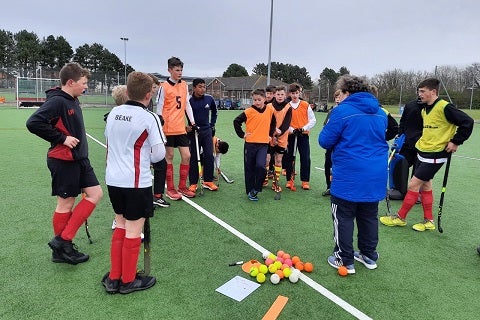- Community
Inspiring Young And Aspiring Female Coaches

Mary Cheesman is always up for a challenge.
Her coaching journey began, as so many do, with her offering her services as a coach at the club at which she played hockey. She is also a teacher and, in that role, has always run after school clubs and inter-school fixtures. It was a natural progression to take a Level 1 coaching course to support her work in the school and club.
As Mary says, initially she thought that would be as far as her formal coach education went but she quickly became hooked on the craft and science of coaching. That inquisitiveness, and a growing awareness that there was a lack of female role models in coaching, drove her to take her Level 2 award.
Supported by Active Norfolk and after a positive assessment by a fellow female coach, Mary passed her Level 2 and was inspired to then work towards her Level 3 qualification. That was when the challenges really began to kick in.
“There were many times when I felt outside my comfort zone and vulnerable about my hockey knowledge compared to others on the course,” she admitted.
“There was a massive amount of work to do and a lot of travel, and this was while I was working full time and had two young children. But I was resolute, supported by my husband, players, coaches, squads I coached, and my male mentor who got me through. These support networks were invaluable.”
Mary was awarded the Level 3 in 2013 and, since then, has become club coaching coordinator, Player Pathway coach, Norfolk Player Pathway Lead Coach, Women’s first team coach and responsible for supporting coach development in Norfolk.
Her latest project is to lead on the Norfolk Hockey Association (NHA)’s Coaching Community: Coaching Girls project, which began in January of this year.
“However, women also have the responsibility to challenge and to change the norms. We must support a wider range of coaches coming into the sport, to enhance our coaching and consequently the coaching experience of our players. There are doors still to be opened.”
As a female coach, Mary is more than aware of the paucity of female coaches working in hockey, particularly at elite level. It is something the Norfolk Hockey Association, following the lead of England Hockey, is seeking to address. Working alongside England Hockey, NHA ran a bespoke coaching programme in 2019-2020 to develop and upskill the coaching workforce. Female coaches were one of the targeted groups and represented 40 per cent of the overall number of participants, indicating a desire among female coaches to progress within hockey coaching.
Following that programme, the development of a Norfolk Coaching Community was implemented with Coaching Girls the topic of the group’s opening sessions.
Mary explains that the aim of the Coaching Community: Coaching Girls session is two-fold: “On the one hand I was asking myself and the player pathway coaches more and more questions about how we are coaching our girls’ squads and how we can meet their needs while challenging them to be more experimental, creative and have the confidence to problem solve.
“And then we needed to ask ourselves how we can encourage the players themselves to become leaders and coaches and ultimately the role models our young female players need. We want to enhance their coaching experience with a more diverse coaching body.”
The first online session in January attracted 18 participants and represented eight clubs. Discussion was free-flowing and ranged across a wide range of topics, including: coaching girls at different ages; how to attract and retain female players and coaches; coaching in different environments; the similarities and differences between coaching boys and girls; coach/player relationships; the role of parents; female role models; and the importance of club infrastructure in identifying, developing and recruiting female coaches at all levels.
As Mary says: “Each participant took away something to try practically in their coaching environment or to look at the coaching practice/recruitment in their club. It felt like it was a really positive, reflective session with feedback coming in by email the next day to start new discussions and possible activities.”
A follow-up online session is planned for February, while the NHA is planning an active session in the summer for women interested in getting into or developing their coaching and a summer Young Leaders course for players.
The importance of sessions such as the NHA Coaching Community: Coaching Girls is being recognised across the country, with many clubs and associations making their own plans. Mary is clear about the motivation behind her work.
“Change is happening but there are still many barriers and stereotypes to overcome. Developing more female coaches is one strand of inclusion. Women still tend to have greater family responsibilities and, therefore, less time. And there are not enough role models, especially at the elite end.
“Female coaches can lack confidence in their experience, knowledge and other skills to put themselves forward, and the perspective of those recruiting and appointing in clubs and other organisations is still too narrow.
“However, women also have the responsibility to challenge and to change the norms. We must support a wider range of coaches coming into the sport, to enhance our coaching and consequently the coaching experience of our players. There are doors still to be opened.”
